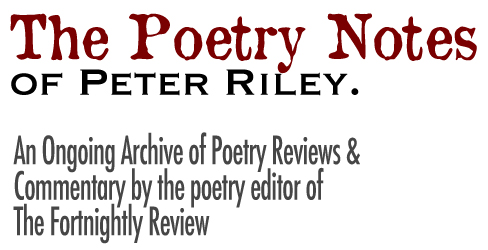Peter Riley: An undetached calm is the signal feature of his poetry in the first half of the 1960s, as he carefully learns to hold language and syntax in his own terms, and the instances and concerns of the provincial and unprofessional life he lives are more and more projected outwards towards reader and world as linguistic vectors. He is clearly moving, in no rush but determinedly, towards a version of the local which remains local but of greater reach. He remained local for ever; even on the other side of the earth thirty years later…’
-

-
Mariangela
Ian SeedThree texts
Rupert M LoydellVessel
Melita SchaumSome Guts
Simon Collings (with collages by John Goodby)Three Short Fictions
Meg PokrassThe Campus Novel
Peter RobinsonCharlie Boy and Captain Fitz: A One-Act Play
Alan WallSnapshot, Sachsenhausen and three more poems
Peter BlairSeven short poems
Lucian Staiano-DanielsFour prose poems
Olivia TuckThe Back of Beyond and two more prose poems
Tony KittTwo poems
Moriana Delgadofrom Reverse | Inverse
Lucy HamiltonSix haibun
Sheila E. MurphyKingfishers and cobblestones and five more new poems
Kitty HawkinsZion Offramp 76–78
Mark ScrogginsCome dancing with me and two more new poems
Marc VincenzPlease swipe right
Chloe Phillips‘Three Postcards’ and a prose poem
Linda BlackStill life
Melita SchaumIn memory of
John Taylor with drawings by Sam ForderImmortal wreckage
Will StoneNew in Translation
Snowdrifts
Marina Tsvetaeva, trans. by Belinda CookePoems from Prière (1924)
Pierre Jean Jouve, trans. by Will StoneSix prose poems
Pietro di Marchi, trans. by Peter RobinsonThe goddess of emptiness.
Jean Frémon, trans. by John Taylor -
A new Review of John Matthias’s Some Words on Those Wars by Garin Cycholl.
Anthony Howell’s review, A Clutch of Ingenious Authors: Michelene Wandor Four Times EightyOne: Bespoke Stories | Annabel Dover Florilegia | Sharon Kivland Abécédaire
Essays by Alan Wall
· ‘King of Infinite Space’: The Virtue of Uncertainty
· AI: Signs of the Times
· The Lad from Stratford
· Stanley Kubrick: Sex in the CinemaWill Stone’s Missing in Mechelen and At Risk of Interment
G. Kim Blank’s Civilizing, Selling, and T. S. Eliot Curled Up behind the Encyclopædia Britannica
Tronn Overend’s Samuel Alexander on Beauty
AND Conor Robin Madigan’s Master Singer, Simon Collings’s Robert Desnos, Screenwriter, and Igor Webb’s Never Again

Simon Collings, Carrying the past: The Afterlight by Charlie Shackleton.
New Fortnightly Serials
from The Runiad
Anthony Howellfrom White Ivory
Alan Walland much more below this column.
Departments
-
Contact the Editors here.
-
Audio archive: Two poems, with an audio track, from Heart Monologues by Jasmina Bolfek-Radovani | Daragh Breen’s Aural Triptych | Hayden Carruth reads Contra Mortem and Journey to a Known Place | Anthony Howell reads three new poems | James Laughlin reads Easter in Pittsburgh and five more | Peter Robinson reads Manifestos for a lost cause, Dreamt Affections, Blind Summits and Oblique Lights

Previous Serials
2011: Golden-beak in eight parts. By George Basset (H. R. Haxton).
2012: The Invention of the Modern World in 18 parts. By Alan Macfarlane.
2013: Helen in three long parts. By Oswald Valentine Sickert.
2016: The Survival Manual by Alan Macfarlane. In eight parts.
2018: After the Snowbird, Comes the Whale, by Tom Lowenstein.

LONDON
Readings in The Room: 33 Holcombe Road, Tottenham Hale, London N17 9AS – £5 entry plus donation for refreshments. All enquiries: 0208 801 8577
Poetry London: Current listings here.
Shearsman readings: 7:30pm at Swedenborg Hall, 20/21 Bloomsbury Way, London WC1. Further details here.NEW YORK
10 reliable poetry venues in NYC.
· The funeral of Isaac Albéniz
· Coleridge, poetry and the ‘rage for disorder’
· Otto Rank
· Patrons and toadying · Rejection before slips
· Cut with a dull blade
· Into the woods, everybody.
· Thought Leaders and Ted Talks
· How Mary Oliver ‘found love in a breathing machine.’
AND read here:
· James Thomson [B.V.]
A dilemma for educators:
Philosophy and the public impact.
.
Michelene Wandor on Derek Walcott and the T.S. Eliot Prize.
.Nick Lowe: the true-blue Basher shows up for a friend.
Anthony Howell: The new libertine in exile.
Kate Hoyland: Inventing Asia, with Joseph Conrad and a Bible for tourists.
Who is Bruce Springsteen? by Peter Knobler.
Martin Sorrell on John Ashbery’s illumination of Arthur Rimbaud.
The beauty of Quantitative Easing.




















The relentless fury of Ed Dorn 2.
Peter Riley: ‘Statements in “Thesis” may not be justifiable from a rationalist point of view, but they are wrapped in royal robes of rich figuration and rhetorical gestures. Now the poems broadcast the author’s opinions unconcealed, and all the more starkly in the modes of irony and sarcasm he adopts. They are largely bare too of all sense of place as landscape with or without human figures — all we have is mockery in a desert. His extremist or hyperbolic statements now stand exposed to anybody’s questioning, especially “Is this actually true?” The wit and the deftness of script discourage us from asking the question, but it cannot be kept at bay for ever.’